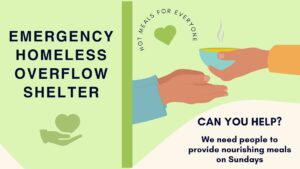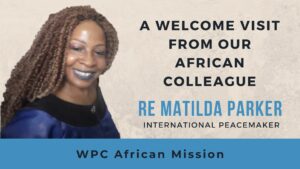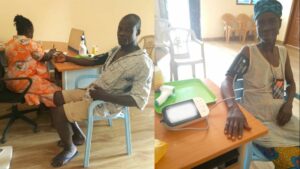Where do we start? We feel threatened by something we can’t see but whose results are increasingly, painfully obvious. It’s a time to breathe deeply, admit we are confused and stunned, then to pray, and stick together in spirit and in reality. There are websites to help tell us, “What it means, What is True, and What to do.” Some very tense religious people are going to insist that their Scripture answers all these questions. Some quote Psalm 91:5-6: “You will not fear the terror of the night, . . . , or the plague that stalks in darkness.” “Trust God and pray,” say others. There’s nothing wrong with that but we can’t then just sit back. God’s answers to our prayers often include the words “Okay, I’m with you. Now here’s your part in answering your prayer.” Our part begins with getting good information. I have shared a link to the CDC COVID 19 information on the church Facebook page. We have published via the website, the Facebook page and in print at the church, a list of all the precautions we have taken so far. We expect these will be changed and added to as we go on. Likely even by the time you read this. What else do we do? Minister and counselor Ginger Rothhaas tells us to avoid “awfulizing.” Awfulizing “begins with an honest fear and then our imagination grows it into a worst case scenario very quickly. It might sound like this: Coronavirus is spreading into my city. What if I am infected? What if I already have it and don’t know it yet? What if I’m spreading it to my family right now? What happens if we all get it? What if I die from this?” That is awfulizing. The fact is that a virus is spreading, but our fear takes us right into the extreme what-if scenarios and we imagine the worst possible outcome. What do we do when it feels like we are all doomed, and the future will only be worse? We start by gathering up pieces of truth we have learned from life and from God. We are being reminded that, as Frederick Buechner put it, “Here is the world. Beautiful and terrible things will happen. Don’t be afraid.” Remember the beauty and face the dangers. Trust the following truths. Grace always does bat last, and the light always overcomes the darkness–always, historically. But not necessarily later the same day, or tomorrow, after lunch. So keep sharing kindness and encouragement to everyone. This pandemic will be hard, but we’re good at hard. So is our Lord who faced trials, temptations, pain, and death. But the end was resurrection. Jesus’s love for the poor and refugees is part of the answer. Remember that the poor, the innocent, babies, and the very old always bear the brunt of hardship and disaster. Do not abandon them. So how do we shelter in place in the midst of fear? We stick together in our anxiety and cluelessness. We reach out for any help at all; we share any truth and encouragement and humor we come upon. We feed the poor and send money to people who are helping save children. Helping others is good for them and for the helper. It shows there are things anyone can do in a challenging time. You can pray for God’s steadying Spirit to be with you in your anxiety. You can help by praying for or with someone, by phone or in person. You can help by not using the medical system unless it is urgent. You can stay apart from others as much as possible. You can maintain phone contact with people. You can help by staying home if you are sick. If you are healthy, help by cooking or shopping or doing errands for a friend who needs to stay home. You can help by watching someone’s child if they need to go to work. You can help by ordering take-out or delivery from your local restaurants. Eat the food yourself or find someone who needs it.. You can help by asking yourself, “What can I and my family and my church do to help?” “What can we offer?” You can help by seeing yourself as part of something bigger than yourself. If people are patient and kind, that means a lot. It means something of the Spirit is at work. We will come through this pandemic, but it will take time. I so hate that fact! But I have no alternative, because it is the Truth: it will take time. And there will be times of discouragement.. What do we do then? We show up again and again. Maybe we ask God for help. Maybe we remember Anna’s low point in “Frozen 2.” Gathering her will in a low point, she sang about doing the next right thing. (Watch “The Next Right Thing” on YouTube.) It’s good advice. In challenging times, there is a step we can take. We do the next right thing. We buy or cook a bunch of food for the local homeless. We return phone calls, and smiles. We make eye contact with others, and we are at the market we talk, briefly, and at a safe distance, with people who seem lonely. This is sacramental, allowing God to be present through earthly means. We take the action and the insight will follow: that we individually feel powerless, but we are not helpless. We wash our hands, and follow social distancing. I have no answers but know one last thing that is true: A world struggling with death needs both the hope of resurrection and the power of a God who suffers with us. In a moment where so many get obsessed with themselves, look for new ways to serve others. When the people in our lives see that we care, it will remind them that God does too. Let’s do the next right thing. Rev. Bill Schram began his ministry with Westminster in March 2018 and is the current Interim Minister. Bill attended McCormick seminary in Chicago and met his wife Jenny there. They have served as co-pastors and in separate positions. He has served churches in urban, near suburb, small town, county seat towns in various positions such as pastor, associate pastor, interim pastor, and hospital chaplain. He and Jenny have two natural and one foster daughter. Delightfully, they now have a granddaughter to enjoy.




